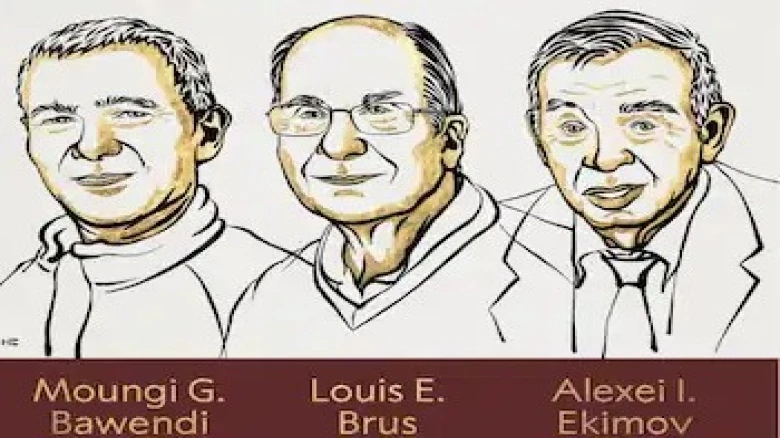Regional
His legacy reminds us of the importance of self-reliance, courage,...

The Royal Swedish Academy of Sciences announced on Wednesday that the Nobel Prize in Chemistry for 2023 has been awarded to...
Digital Desk: The Royal Swedish Academy of Sciences announced on Wednesday that the Nobel Prize in Chemistry for 2023 has been awarded to three distinguished scientists: Moungi G. Bawendi, Louis E. Brus, and Alexei I. Ekimov. The trio received the prestigious accolade for their groundbreaking work on the discovery and synthesis of quantum dots, nano-sized particles with remarkable properties that have found applications in diverse fields.
Quantum dots, minuscule nanoparticles whose properties are determined by their size, have ushered in a new era of technological innovation. These infinitesimal components of nanotechnology have become ubiquitous, illuminating our televisions and LED lamps, aiding surgeons in tumor removal surgeries, and much more.
The announcement, made in Stockholm, marks a significant moment in the ongoing Nobel Week, which celebrates achievements across six different fields. This year's laureates have pushed the boundaries of our understanding of quantum phenomena and have harnessed them for practical applications.
Alexei I. Ekimov's contribution to the field includes the creation of size-dependent quantum effects in colored glass. His pioneering work in this area has opened up new avenues for manipulating light and materials, with potential applications in optics and electronics.
Louis E. Brus, from Columbia University, is credited with being the first scientist to demonstrate size-dependent quantum effects in particles suspended in a fluid. This groundbreaking work has had a profound impact on the development of quantum dots and their application in various technologies.
Moungi G. Bawendi, associated with the Massachusetts Institute of Technology, has played a pivotal role in revolutionizing the chemical production of quantum dots. His work has paved the way for the controlled synthesis of quantum dots with tailored properties, enabling their use in a wide range of applications.
The Nobel Prize in Chemistry holds a special place among the Nobel Prizes, as it was explicitly mentioned in the will of Alfred Nobel. Chemistry was not only integral to Nobel's own work, but it was also the second-prize area he highlighted in his testament. His inventions and industrial processes were deeply rooted in chemical knowledge, underscoring the importance he attached to this field of science.
This year's Nobel Prize in Chemistry follows last year's recognition of Carolyn Bertozzi, Morten Meldal, and K. Barry Sharpless for their contributions to the development of click chemistry and bioorthogonal chemistry, which have significantly advanced the field.
In addition to the Chemistry Nobel, the Royal Swedish Academy of Sciences also recently announced the Nobel Prize in Physics, awarded to Pierre Agostini, Ferenc Krausz, and Anne L’Huillier for their pioneering work on generating attosecond pulses of light, providing invaluable tools for studying electron dynamics in matter. The Nobel Prize in Medicine was presented to Katalin Kariko and Drew Weissman for their pivotal role in the development of mRNA vaccines, a crucial tool in the battle against COVID-19.
The Nobel Prize in Chemistry has historically been awarded to a diverse group of scientists. Of the 191 laureates who have received the prize, eight have been women. This reflects the growing recognition of female scientists' contributions to the field, with Marie Curie being the first woman to receive the award in 1911 for her pioneering research on radioactivity.
Leave A Comment